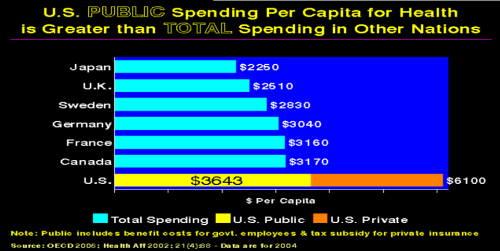I received your e-mail today and there were several things in it that I couldn’t let go without responses. I understand your desire to have your progressive base be enthusiastic about this bill, but I have to say… if you want us to be enthusiastic, you should try giving us something to be enthusiastic about. Conservatives may be willing to believe that if their leaders polish a turd it becomes something else, but we progressives know shit when we see shit, and it doesn’t matter how big your smile is when you hand it to us… we still know its shit.
In your e-mail you said this.
We will have beaten back the special interests who have for so long perpetuated the status quo.
No, actually, you did not. The pharmaceutical companies are one of the two major special interests most responsible for the healthcare crisis and instead of beating them back, you bought them off by promising not to reform them. When Congress balked at the sweetheart deal you gave them, you protected this special interest with a vigor you didn’t use when it came time to protect their customers.
And you certainly did not beat back the insurance companies. The insurance companies spent hundreds of millions of dollars campaigning against health reform, and why? Because it was an investment well worth making because they won! You handed them 30 million new customers, a trillion dollars of revenue straight from the US Treasury, you walked away from any means of controlling their prices or healthcare costs in general, you left gaping loopholes in the supposed limitation on their administrative costs… lets face it. The lobbying money they spent this year was a rock solid investment for them. It paid dividends unlike any investment they have ever made in the past. And every last dollar of them is coming out of your constituents’ hides.
You said in your e-mail:
Parents will have the security and stability of knowing their insurance can’t be revoked at a moment’s notice.
No, they won’t. While insurance companies cannot kick people out for getting sick… they have never been able to do that. What they kick people out for when they get sick is “fraud” which they have been able to define as any little typo, mistake, omission, error, misspelling, smudge, or flyspeck on an application. And you did nothing to change this. They will still be able to do this, and they will. You could have closed this loophole, but you decided to leave it open… and to take credit for fixing a problem you left there.
You said:
And the skyrocketing costs plaguing our small businesses will be brought under control.
Again, no, they won’t. You allowed Joe Lieberman, apparently without even so much as asking him to explain why let alone pressuring him not to, to eliminate the last vestige of any mechanism to control insurance costs. Surely you do not think these costs will be brought under control because you want them to be. If you wanted them to be controlled, you would have insisted that the bill contain some mechanism for controlling them. But you didn’t, it doesn’t, and they will increase however fast the insurance companies would like them to increase.
The most irritating statement you made is this one.
When you make calls, write letters, organize, this is the change you’re making — a better life for your family and for men and women in every state.
When we made calls, wrote letters, and organized, it was entirely for naught. We got no change. We got nothing. We got a bill that hurts us and helps corporations… exactly what we would have gotten if we’d made these calls during a debate under the Bush administration. We got zero for our efforts. We got ignored by you and by the Congress and the insurance and pharmaceutical companies will be laughing at our quaintness for decades to come.
Toward the end of your e-mail you said this.
There is still more to do before I can sign reform into law — a last round of negotiations and final votes in the Senate and the House — and I’m counting on your help every step of the way.
Mr. President, I’m sorry to say… you are on your own on this. I don’t think you’ll mind since you’ve been acting all along as if you were all alone when you weren’t, but I think most of us are done. I cannot in good conscience help you any more with this bill. I don’t support what it has become and I don’t appreciate you taking the Bush stance that we should think something is good because it is good for your presidency, even though it is clearly bad for us. That is not change, and it isn’t what I was hoping for.
Lastly, you said this, and this is what really stung me the most.
P.S. — Organizing for America supporters are signing a note of appreciation to all the senators who have worked so hard to make this possible. I hope you’ll join them:
Honestly, Mr. President. Forgive my French, but… are you shitting me? Right after you said “This isn’t going to hurt a bit” these senators shoved a whole stethoscope up our ass. The only appreciation I have for them right now is that they left the Sphygmomanometer off when they did it.
Merry Christmas to you, Mr. President, though, and lets hope for a happier New Year than this one has been.
YellaDog

